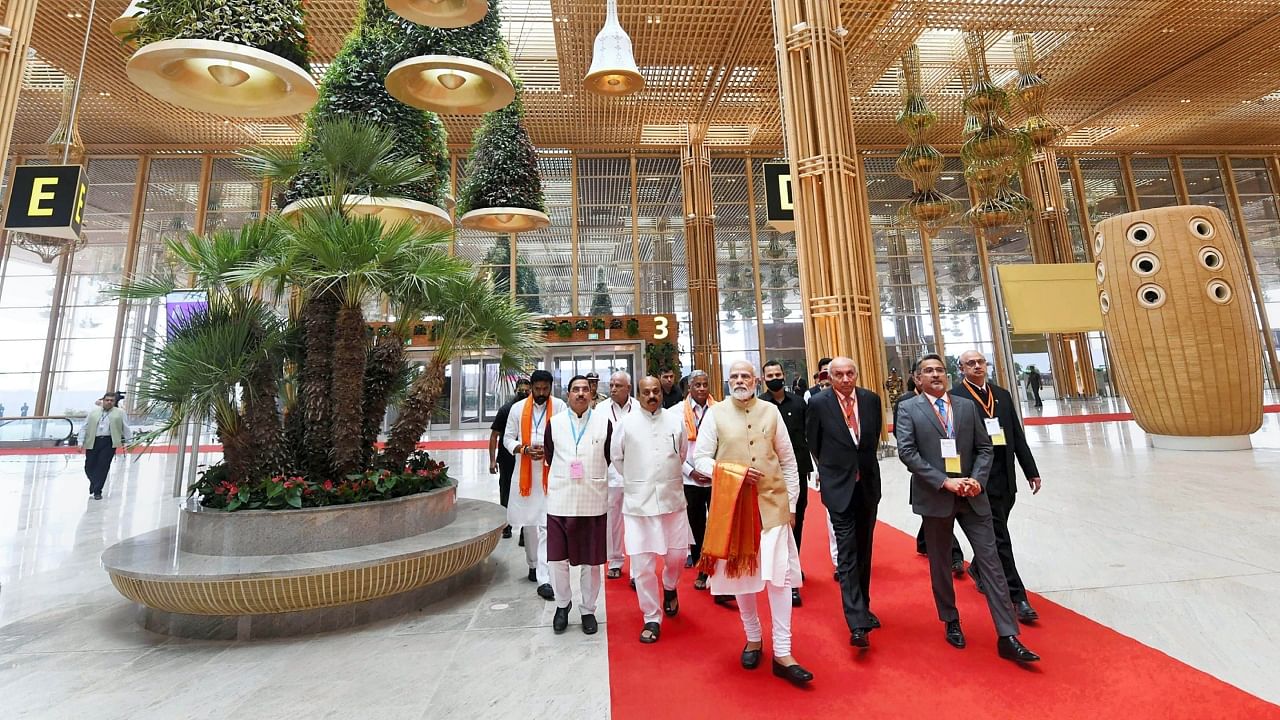
Prime Minister Narendra Modi on Friday used a well-calibrated visit to Bengaluru lasting five hours and 20 minutes to launch projects as well as send a political message to specific communities in the state where polls are due next year.
Modi flagged off the south’s first Vande Bharat train and opened the swanky second terminal of the Kempegowda International Airport. Later, at a public meeting, the PM said his government believes speed as India’s aspiration and scale as its strength, unlike previous governments.
The visit was laced with potent symbolism.
Modi participated in an event to mark the birth anniversary of Kanaka Dasa, the saint poet revered by the Kuruba community and garlanded a portrait of Veera Vanithe Onake Obavva, who is said be from the Dalit (right) and celebrated for her heroics against the forces of Hyder Ali with a pestle (onake).
Modi's final act of political messaging came at the international airport, where he unveiled the imposing 108-feet tall bronze statue of Vokkaliga icon Nadaprabhu Kempegowda, the founder of Bengaluru.
While the Vokkaligas are the backbone of the H D Deve Gowda-led JD(S), Kurubas and Dalit (Right), commonly known as Chalavadis, have always rallied behind the Congress.
With Assembly elections due in April-May next year, the BJP is trying to woo these communities to retain power in the state.
The choice of Devanahalli in Vokkaliga-dominated Bengaluru Rural district for Modi's rally was to send out a strong message to the community.
The presence of influential seer Nirmalananda of the Adichunchangiri Math also gave a boost to the party, as he praised Modi as a ‘Modern Day Kempegowda’.
The BJP also managed to bring SM Krishna, a Vokkaliga leader, to the PM's event.
Modi generously quoted philosophical quotes by Kanakadasa and Maharshi Valmiki to drive home a point on how he is trying to usher in a "peaceful and harmonious society with equal opportunities" in the country.
He also highlighted the bravery of Onake Obavva who is also seen as the rakhi sister of Madakari Nayaka, a chieftain belonging to the Nayaka (Valmiki) community.
Also Read | From conflicts to climate crisis, Mahatma Gandhi's ideas have answers to today's challenges: PM Modi
The move is being seen as an attempt by the saffron party to appropriate a Dalit icon and evoke the brother-sister bond among Dalits and the Nayaka community.
In the last leg of his speech, Modi highlighted how he has been instrumental in launching Bharat Gaurav Trains across the country to help to showcase the country's rich cultural heritage.
Sandeep Shastri, a political scientist, told DH that political symbolism does play a vital role during elections.
“PM Modi has somehow mastered the art of sending the right messages ahead of every election for the last 9 years in a row, and he did it on Friday. But, as of now, one can easily state that the Vokkaliga vote is heading for a 3-way split in this election,” he said.
But he also noted that political symbolism alone cannot ensure any party’s victory. “While symbolism may lay the foundation, without commitment success will be a distant mirage,” he said.